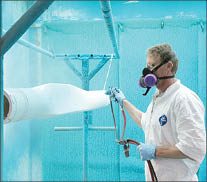Aircraft component manufacturer Triumph Composite to hike hiring
Aerospace supplier ramps up toward 700 workers

Spokane-based Triumph Composite Systems Inc., which manufactures composite interior components for commercial aircraft, expects to ramp up hiring by next year to keep pace with Boeing Co.'s scheduled production increases.
Tim Stevens, Triumph Composite Systems president, says the company now employs about 620 people, and that number is likely to be closer to 700 employees by next summer.
Triumph Composite Systems, a subsidiary of Pennsylvania-based Triumph Group Inc., is seeing a boost in its work for Chicago-based Boeing. Last year, Boeing announced significant production hikes for all its jetliners to be phased in over three years to meet global demand, including its 737, 777, and 787 aircraft assembly lines at Puget Sound-area manufacturing sites.
Additionally, Boeing announced last year it will base future production of its new 737 MAX aircraft at its current 737 manufacturing site in Renton, Wash.
Stevens, who spoke before about 200 people at the seventh annual Governor's Aerospace Summit held here in Spokane this month, says the company expects to be at around 650 employees by January. He says a majority of the new hires will be production mechanics, but the company also will add a few engineers.
The company already has boosted employment by about 100 people since late 2010. A Nov. 3, 2011, Journal story reported that Triumph Composite then had 566 employees, up from 516 workers a year earlier.
Triumph Composite declines to disclose its annual revenue, but Stevens says its sales this year are up about 10 percent compared with last year.
"At our Spokane site, we have a payroll of over $27 million" a year, Stevens says. The company also generates work for other Northwest companies, ranging in location from Yakima to Sandpoint, that "provide us with $12 million's worth of goods and services."
However, Stevens also says aerospace suppliers need to meet the challenge in coming years to increase research and development of next-generation technology that will lower costs and increase efficiency.
"Boeing and Airbus are putting pressure on suppliers to reduce costs," he says. "We have to lower our costs."
He says investing in research and development of new technology for aerospace manufacturing is crucial at Triumph Composite and among other aerospace suppliers "so we can continue to provide high-paying jobs." Without such ongoing technology improvements, Boeing may consider over the long term moving some supplier jobs to other countries where wages are lower, he adds.
The Inland Northwest has more than 80 aerospace-related companies that together employ more than 8,000 people, contributing $500 million in annual economic impact, Greater Spokane Incorporated says. Among them is UTC Aerospace Systems with a West Plains plant here that makes carbon aircraft brakes, formerly as a Goodrich Corp. facility. In July, Hartford, Conn.-based United Technologies Corp. acquired Goodrich and absorbed it into its UTC Aerospace Systems business unit.
Triumph Composite, which operates out of 394,000 square feet of space at 1514 S. Flint near Airway Heights, manufactures environmental control system ductwork, aircraft floor panels, and other nonstructural aerospace products at its facility. It has 51 acres on its site near U.S. Highway 2.
Its parent company, Triumph Group Inc., has 64 sites worldwide for man-ufacturing and overhauling aerospace structures, systems, and components, its website says. The Spokane facility opened in 1990 and operated 12 years as a Boeing facility, until it was sold in 2003 to Triumph Group.
A majority of Triumph's work here continues to be for Boeing, although Stevens says the company does a small amount of work for Airbus.
Triumph Composite says on its website that it supplies the majority of Boeing's composite ducting, and it is the current original equipment manufacturer for all Boeing commercial aircraft floor panels. It has a library of more than 20,000 part numbers with Federal Aviation Administration approval and uses lean manufacturing methods.
The company each month fabricates about 15,000 environmental control system, flight deck, and composite interiors assemblies, as well as 12,000 floor panel assemblies. Triumph Composite also provides aftermarket floor panels to several U.S. airlines.
In fall 2011, Boeing announced it planned to phase in a historic increase in the production rates of all five major commercial airplane programs going into 2014—for the 737, 747-8, 767, 777, and 787. It said in a company publication that the overall 40 percent production increase is aimed at meeting a growing global demand for fuel-efficient and more environmentally-friendly airplanes.
Related Articles




